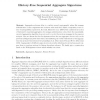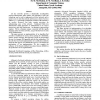252 search results - page 35 / 51 » On Robust Key Agreement Based on Public Key Authentication |
ESORICS
2006
Springer
13 years 11 months ago
2006
Springer
Abstract. Trust-management systems address the authorization problem in distributed systems. They offer several advantages over other approaches, such as support for delegation and...
IACR
2011
12 years 7 months ago
2011
Aggregation schemes allow to combine several cryptographic values like message authentication codes or signatures into a shorter value such that, despite compression, some notion o...
SP
1997
IEEE
13 years 11 months ago
1997
IEEE
Encrypted Key Exchange (EKE) [1, 2] allows two parties sharing a password to exchange authenticated information over an insecure network by using a combination of public and secre...
ISCAPDCS
2003
13 years 9 months ago
2003
Ad hoc networks provide a dynamically reconfigurable network infrastructure where entities can participate at will. Jini technology can be used to implement an ad hoc network, and...
MOBIHOC
2007
ACM
14 years 7 months ago
2007
ACM
Disruption-Tolerant Networks (DTNs) deliver data in network environments composed of intermittently connected nodes. Just as in traditional networks, malicious nodes within a DTN ...


